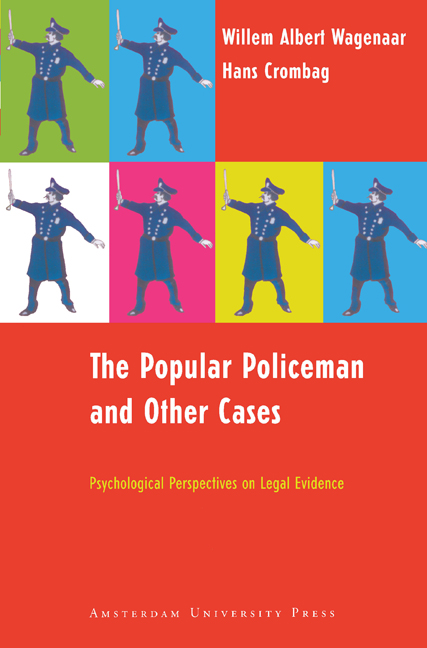Book contents
- Frontmatter
- Contents
- Foreword
- 1 Illegal Gambling or the Victory Travel Club
- 2 On Causal Reasoning or Death in the Warmoesstraat
- 3 Consumer Confusion or Potato Chips and Olive Oil
- 4 Fiction and Reality of ‘the Average Individual’ or the Case of Old Mr. Lane
- 5 Case Histories and Scientific Proof or the Case of JR
- 6 Not a Good Story or the Disappearance of Maddy and Vicky
- 7 Conflicting Scenarios or the Case of the Man who Needed a Companion
- 8 Two Processes Obstructing the Accuracy of Long-Term Memory or the Case of the Stolen Mercedes
- 9 Confessions after Repeated Interrogation or the Putten Murder Case
- 10 Collaborative Storytelling or the Artist’s Models and an Angry Neighbourhood
- 11 Allegation of Sexual Child Abuse in a Case of Disputed Visitation or Cindy's Story
- 12 Psychogenic Amnesia or the Case of the Amnesic Strangler
- 13 Obeying Reflexes or Death on the Climbing Wall
- 14 Visual Acuity or Shooting Mimi the Cat
- 15 Sexual Semiotics or the Case of the Popular Policeman
- Postscript: Psychological Expertise and the Law
- Bibliography
- Name Index
- Subject Index
15 - Sexual Semiotics or the Case of the Popular Policeman
Published online by Cambridge University Press: 16 February 2021
- Frontmatter
- Contents
- Foreword
- 1 Illegal Gambling or the Victory Travel Club
- 2 On Causal Reasoning or Death in the Warmoesstraat
- 3 Consumer Confusion or Potato Chips and Olive Oil
- 4 Fiction and Reality of ‘the Average Individual’ or the Case of Old Mr. Lane
- 5 Case Histories and Scientific Proof or the Case of JR
- 6 Not a Good Story or the Disappearance of Maddy and Vicky
- 7 Conflicting Scenarios or the Case of the Man who Needed a Companion
- 8 Two Processes Obstructing the Accuracy of Long-Term Memory or the Case of the Stolen Mercedes
- 9 Confessions after Repeated Interrogation or the Putten Murder Case
- 10 Collaborative Storytelling or the Artist’s Models and an Angry Neighbourhood
- 11 Allegation of Sexual Child Abuse in a Case of Disputed Visitation or Cindy's Story
- 12 Psychogenic Amnesia or the Case of the Amnesic Strangler
- 13 Obeying Reflexes or Death on the Climbing Wall
- 14 Visual Acuity or Shooting Mimi the Cat
- 15 Sexual Semiotics or the Case of the Popular Policeman
- Postscript: Psychological Expertise and the Law
- Bibliography
- Name Index
- Subject Index
Summary
The human species survives through sexual reproduction. For this reason nature has endowed us with a strong desire to engage in sexual behaviour. Sex is perfectly natural for virtually everyone of us. Generally prohibiting it by law would be hard to imagine, but certain types of sexual behaviour are indeed proscribed, in particular sexual acts against the will of one of the participants. Sexual partners must somehow establish mutual consent, which is however almost never recorded in a written and signed contract. In many cases there is also no explicit verbal agreement, but rather some sort of tacit understanding that may develop almost instantaneously, but also after a considerable period of time. Particularly in the early stages of a sexual relationship, the exchange of nonverbal signals plays a major role. Courtship is a risky process, because the signals are almost often ambiguous, and the penalty for misunderstanding them may be high. Moreover, it may happen that although the signals were clear initially, they may be regretted and denied later on. In a case like that, one of the partners may claim that the other overlooked clear signals meant to discourage sexual behaviour and thus crossed the line dividing courtship from a sexual offence.
Normal courtship and sexual semiotics
The normal processes of courtship may be extensively documented in the world's literature of many ages and cultures, but psychology has only just begun to investigate them systematically, while legal scholarship appears not even to have discovered normal courtship behaviour as a relevant issue. However, the legal perspective on what constitutes normal and abnormal courtship behaviour is critically relevant for cases in which one of the participants believes them to have been abused. It appears that even the normal steps of courtship may be considered punishable whenever one party files a complaint. The law provides no benchmark for distinguishing between legally acceptable and unacceptable courtship behaviour. The demonstration of sexual interest in another person may come close to stalking, and there may be a smooth transition between gentle seduction and sexual assault.
The correct understanding of the function and meaning of signals in the process of normal courtship is important, not only for the success of the process, but also for the safety of the participants.
- Type
- Chapter
- Information
- The Popular Policeman and Other CasesPsychological Perspectives on Legal Evidence, pp. 235 - 250Publisher: Amsterdam University PressPrint publication year: 2012



